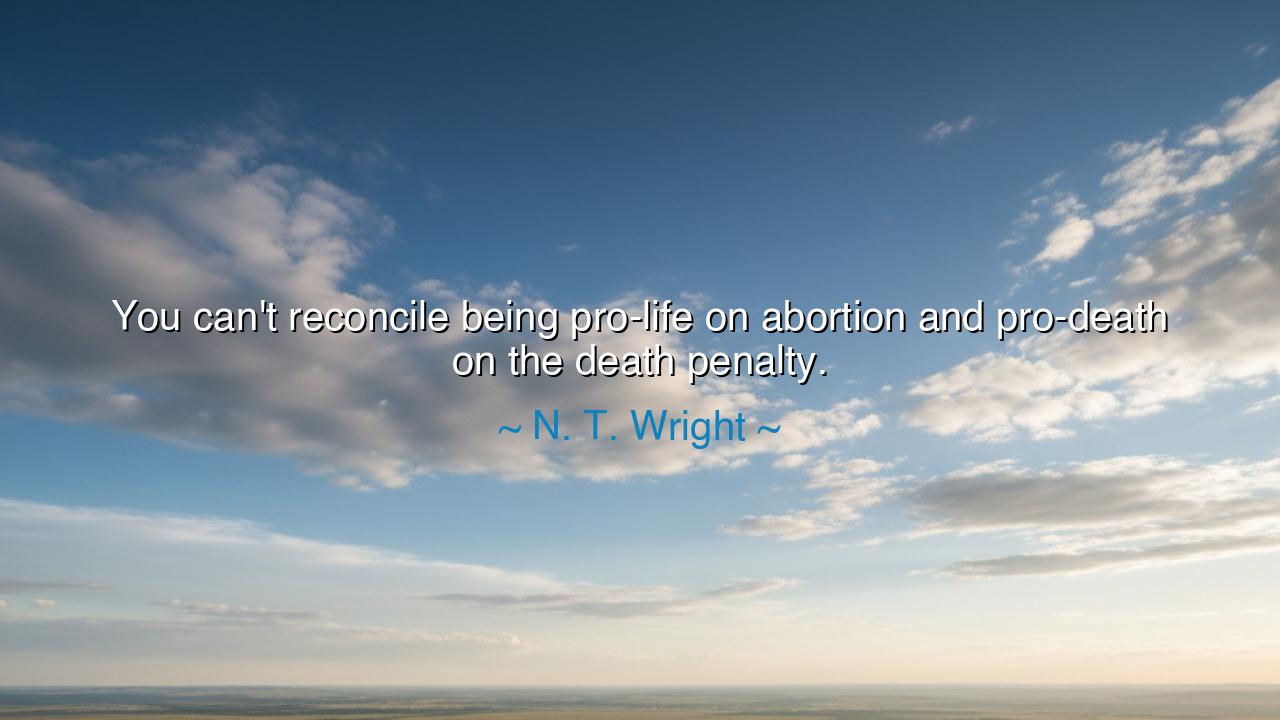
You can't reconcile being pro-life on abortion and pro-death on






"You can’t reconcile being pro-life on abortion and pro-death on the death penalty." Thus spoke N. T. Wright, a theologian of deep reflection and moral clarity, whose words pierce through the tangled contradictions of human conscience. In this declaration, he summons us to the altar of consistency, where belief and action must meet in harmony. His message is not one of politics, but of truth and integrity—a reminder that the sanctity of life cannot be divided or measured by convenience. To claim to be pro-life, he teaches, is to cherish life in all its forms, not only when it is innocent or useful, but even when it is flawed, fallen, or condemned.
The origin of this statement lies in the moral discourse of modern Christianity, where debates over abortion and the death penalty have long stood as twin pillars of ethical tension. Wright, a scholar and bishop of the Anglican tradition, sought to awaken the moral imagination of his age, challenging believers to see beyond partisan divides. He observed that many who loudly defended the unborn often supported the execution of the guilty, forgetting that both, in their own way, are bearers of the divine image. For Wright, such a contradiction is untenable. The value of life, if it is sacred, cannot depend upon circumstance. Whether at its first breath or its last, life remains a gift from God, and to claim dominion over it is to trespass upon sacred ground.
The ancients, too, wrestled with the weight of justice and mercy. In the laws of Rome, execution was the instrument of order, and yet philosophers like Seneca and Marcus Aurelius questioned its moral necessity. Even in their pagan wisdom, they discerned a higher law—a law that whispered of compassion, of restraint, of the dignity that lingers even in the condemned. Centuries later, Christ Himself stood before an execution, not as the executioner, but as the executed—innocent yet condemned, silent yet redeeming. His death transformed the very symbol of death—the cross—into a sign of life eternal. To follow Him, therefore, is to reject vengeance and embrace redemption. Thus, Wright’s challenge is nothing new; it is the echo of the Gospel itself: that mercy triumphs over judgment.
Consider the story of John Newton, once a captain in the slave trade, who later became a priest and author of the hymn Amazing Grace. In his youth, he dealt in death and suffering, profiting from the bondage of others. Yet when the light of repentance touched him, he saw the horror of his deeds and spent the rest of his life defending the dignity of the enslaved. Newton’s conversion was not partial; it was total. He understood that to honor life is to honor all of it—to turn from cruelty in every form. His story mirrors Wright’s call: that true moral conviction cannot be selective, but must be whole and unwavering, honoring life from cradle to grave.
Wright’s words also expose a deeper hypocrisy that dwells within nations and hearts alike. Societies that mourn the loss of the unborn while celebrating the destruction of the condemned stand divided against themselves. To be pro-life, Wright suggests, is not a political slogan but a spiritual vocation. It is a posture of reverence toward the miracle of existence. The murderer on death row and the infant in the womb are both threads in the same divine tapestry. To tear one thread is to weaken the whole. A people who value convenience over consistency will find that their moral foundations crumble beneath them, for justice cannot thrive where compassion is divided.
And yet, Wright’s message is not condemnation but invitation—an invitation to integrity, to a deeper understanding of what it means to defend life. He calls us to see beyond anger, beyond ideology, to the mystery of the human soul. For if we claim to stand for life, we must also stand for mercy, and if we seek justice, we must temper it with grace. The wise know that it is easy to defend the innocent, but true greatness lies in protecting even the guilty from hatred’s fire. To affirm the sanctity of life is to believe in redemption, to trust that even the darkest heart may yet find light.
So, my listener, let this teaching settle in your spirit: do not divide your compassion. To live righteously, you must see every life as sacred, even when it offends your sense of justice or your comfort. Look upon every soul—the unborn, the broken, the condemned—and recognize the same divine spark that burns within you. Let your conscience be whole, not fractured by convenience. If you must choose, choose mercy; if you must judge, judge gently; if you must act, act with love that preserves life rather than extinguishing it.
For in the end, as N. T. Wright declares, the true measure of being pro-life is not found in slogans or laws, but in the courage to love without exception. Life, in all its forms, is sacred ground. To walk upon it carelessly is to lose our humanity; to protect it is to draw nearer to the divine. Let your life, then, be a testimony to the fullness of that truth—that the defense of life is not a matter of policy, but the highest act of faith.






AAdministratorAdministrator
Welcome, honored guests. Please leave a comment, we will respond soon